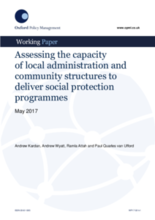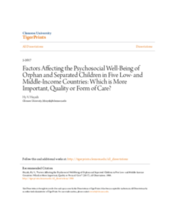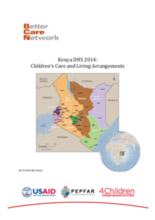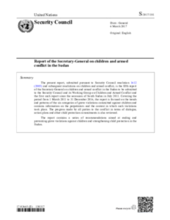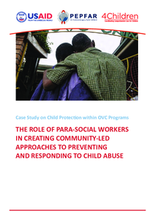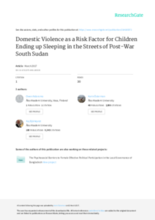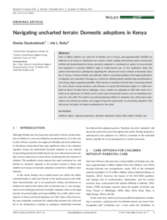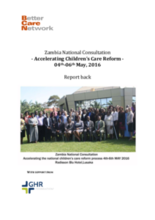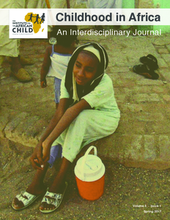Displaying 351 - 360 of 665
This working paper assesses the performance of local and community-based structures in Kenya and Zambia in delivering the government social protection systems that they are tasked to support.
This study explored the extent to which components of quality of care predicted psychosocial well-being of orphaned and separated children (OSC), as well as the extent to which these components of quality of care and demographic factors moderated the associations between care settings and psychosocial well-being of orphaned and separated children (OSC).
This brief is part of a series of country briefs which aim to provide an analysis of children’s living and care arrangements according to the latest
The present report was submitted to the UN Security Council Working Group on Children and Armed Conflict and focuses on the trends and patterns of the six categories of grave violations committed against children.
The following case study outlines the process undertaken by officials, para-social workers (PSWs) and community leaders in several sub-counties in Kasese District in Western Uganda to a) identify and address instances of child abuse in their communities, b) track cases of abuse and encourage reporting by victims, and c) support a para-social workforce in the communities to act as a deterrent and reduce the incidence of abuse.
The study investigated the life of children in the street in post-war South Sudan. A main objective was to examine whether children who slept in the streets although they had parents they could go home to had been victimised more from domestic violence than children working in the street by day but spending the nights at home.
The qualitative study in this article explores adoptions in Kenya: its motivations and barriers and if an increase in domestic adoptions would be in a child’s best interest.
The Zambia National Consultation Accelerating Children’s Care Reform Report is a summary report of a stakeholders’ meeting held between key stakeholders in children’s care in May, 2016.
This issue of Childhood in Africa includes several articles related to children's care, including 'Embedding social justice in Ugandan adoption and legal guardianship cases' and 'The care and support of vulnerable children by foster care families in Uganda: Lessons in social justice and social protection.'
Bringing together cross-disciplinary expertise, this volume addresses a vast range of topics related to child abuse and neglect in Uganda.

